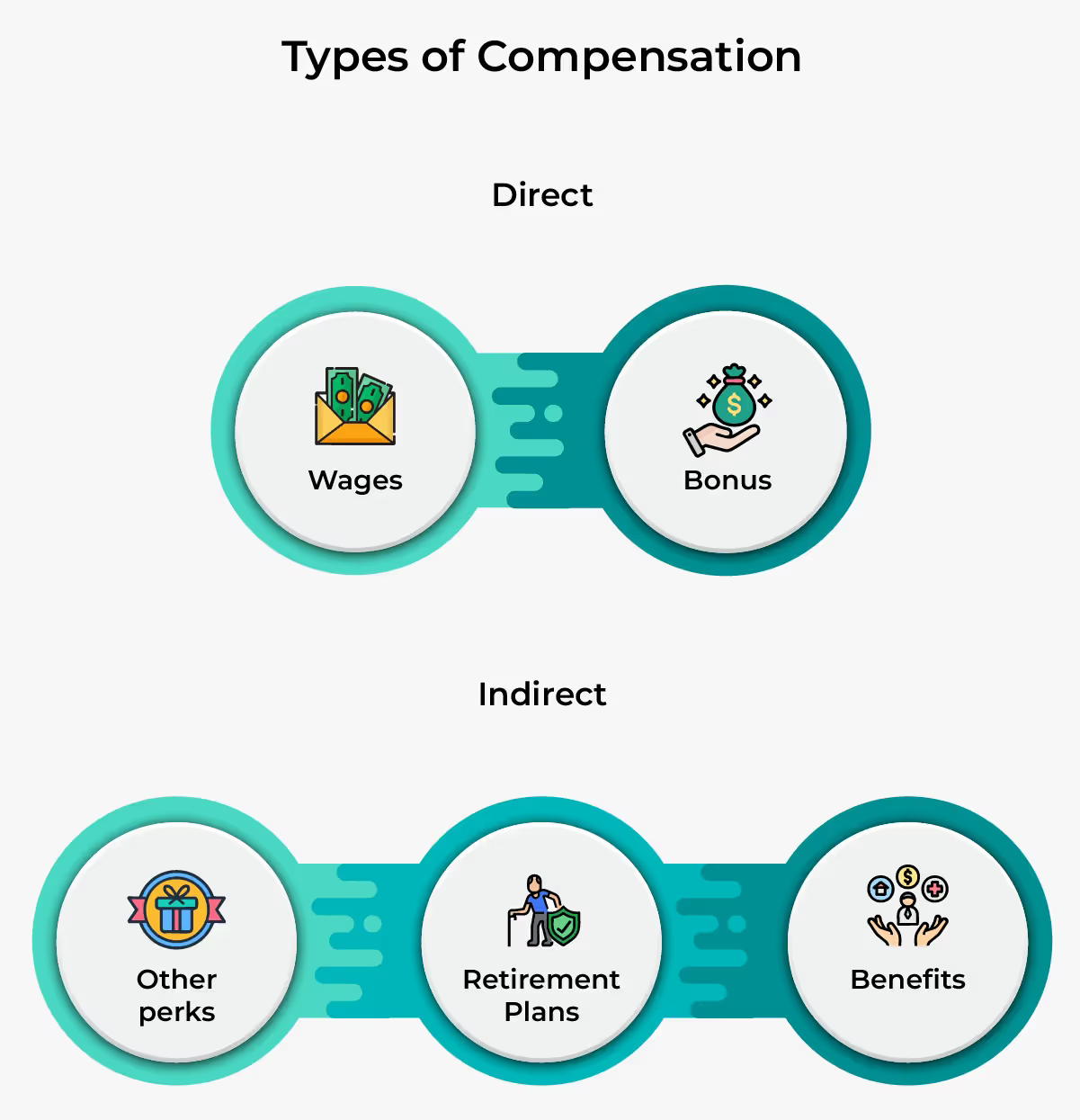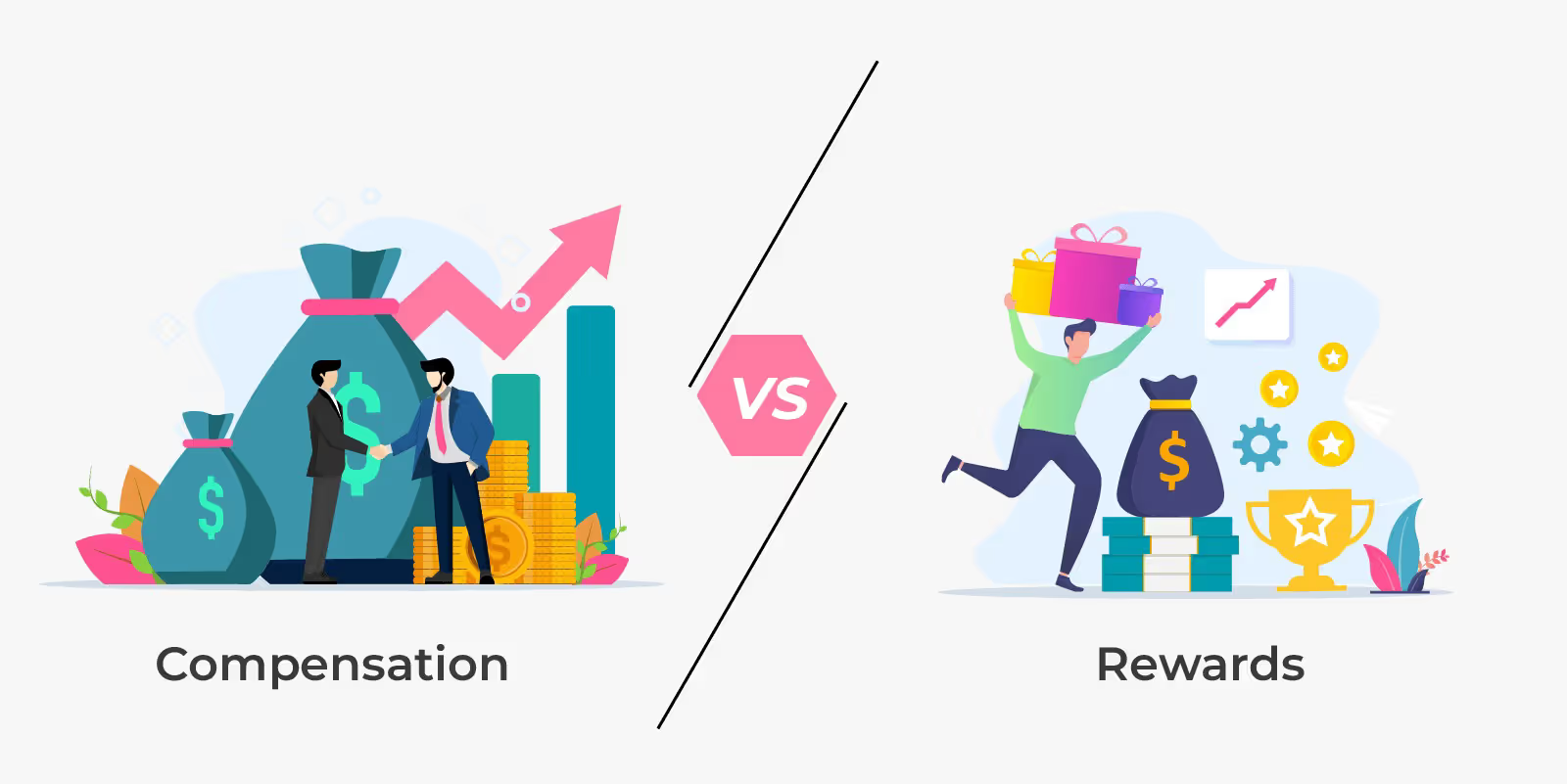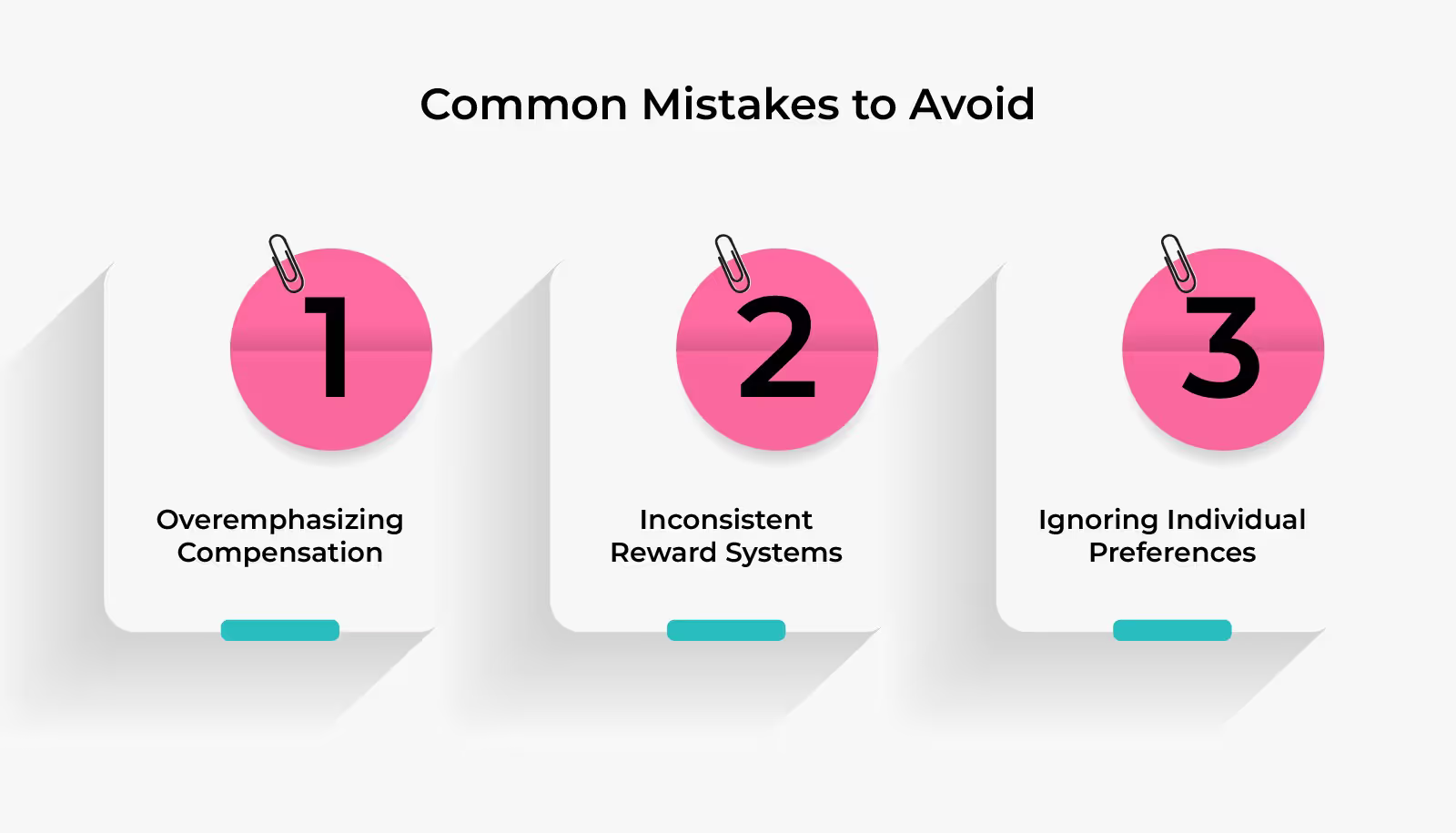
Blog
Understanding the Difference Between Compensation and Reward
October 21, 2024


Key Insights
Compensation vs. Reward: Key Differences and Why They Matter
In any business, "compensation" and "reward" often get thrown around interchangeably.
They actually serve very different purposes and play unique roles in employee motivation and satisfaction.
Understanding the distinction is crucial for both employers and employees.
It impacts how businesses retain talent and shapes how employees perceive their value in an organization.
Why the Difference Matters for Employers and Employees
From the employer's perspective, blending the concepts of compensation and rewards can lead to mismanagement of resources. You might end up overpaying employees for basic tasks or failing to incentivize top performers appropriately. For employees, the confusion could lead to frustration, wondering why hard work isn't recognized with something meaningful beyond just a paycheck.
What Is Compensation?
Compensation refers to the financial or tangible benefits an employee receives for the work they do. It's an umbrella term that includes wages, salaries, bonuses, and other forms of monetary payment.
Compensation is often seen as the base motivation for most employees, it’s the bread and butter of what gets them to show up to work.
58% of HR professionals say that compensation and benefits are the most important factors influencing the employee experience.
Types of Compensation

Direct Compensation
This is the straightforward, tangible payment that employees receive for their work.
- Wages: Hourly pay for non-salaried employees.
- Salaries: A fixed regular payment, typically on a monthly or bi-weekly basis.
- Bonuses: Extra payments awarded for performance, hitting targets, or company profits.
Indirect Compensation
Often referred to as "fringe benefits," this includes non-cash compensation.
- Benefits: Healthcare, dental, and vision insurance.
- Retirement Plans: 401(k)s, pensions, etc.
- Other perks: Company cars, gym memberships, or paid vacations.
Addition Read: https://www.kennect.io/post/employee-compensation
What Is a Reward?
While compensation is the essential financial exchange for work, rewards go beyond just money. Rewards are given in recognition of an employee's contributions and can be both tangible and intangible.
They are typically used to motivate, engage, and acknowledge an employee's effort and performance.
78% of workers work harder and with more drive when their efforts are being rewarded. Rewards are indeed very important!
Types of Rewards

- Intrinsic Rewards:
These are internal, non-monetary rewards that come from personal satisfaction.
- Personal Growth
Opportunities for skill development or career advancement. - Recognition
Acknowledgment from peers or superiors, such as employee-of-the-month titles or praise in team meetings. - Job Satisfaction
The joy of completing a challenging project or the sense of accomplishment from making a meaningful impact.
- Extrinsic Rewards:
These are external, tangible rewards typically given by the employer.
- Bonuses
Cash payments in recognition of performance. - Promotions
Moving up in the company hierarchy or getting a new job title. - Benefits
Sometimes benefits can also fall under rewards when they are tied to performance, such as access to exclusive perks like extra vacation days or a company-paid trip.

When to Use Compensation vs. Rewards
It’s essential to strike a balance between compensation and rewards. Compensation is a baseline necessity, but it alone might not drive exceptional performance or long-term employee satisfaction.
That's where rewards come in, they add that extra spark, showing employees that their contributions are valued beyond the paycheck.
For example:
- Use Compensation for steady, ongoing work that meets job expectations.
- Use Rewards when an employee goes above and beyond, helping drive business results or contributing to the company culture.
Key Differences Between Compensation and Rewards
Understanding the key differences between compensation and rewards can help businesses create more effective strategies for attracting, retaining, and motivating their workforce.

How Compensation and Rewards Complement Each Other
Let’s dig a little deeper into how compensation and rewards affect your employees on a psychological level. Compensation provides a sense of security, employees know they’re being paid for their time and effort, which allows them to focus on their work without worrying about their financial stability.
However, if that’s all they’re getting, they might fall into a "clock in, clock out" mentality, where they’re just doing the bare minimum to collect that paycheck.
On the other hand, rewards tap into the human need for recognition, appreciation, and personal growth. Rewards add that emotional touch that compensation alone can’t provide.
Ever notice how one good thing can trigger a whole series of positive events? That’s what happens when compensation and rewards work together. Fair compensation keeps employees focused and stable, while rewards inspire them to push their boundaries, innovate, and aim higher. When employees feel valued on both fronts, they’re more likely to be engaged in their work, loyal to the company, and committed to doing their best.
Common Mistakes to Avoid

But here’s a word of caution- the balance between compensation and rewards isn’t always easy to strike, and businesses can sometimes get it wrong. Here are a couple of common pitfalls to avoid:
- Overemphasizing Compensation
If you focus too much on compensation and ignore rewards, you risk having a workforce that’s well-paid but unmotivated. Compensation is the baseline, not the full package.
- Inconsistent Reward Systems
If rewards are handed out too sporadically or without clear criteria, it can lead to feelings of favoritism or unfairness. Make sure that your reward system is transparent and that everyone understands what they need to do to earn recognition.
- Ignoring Individual Preferences
Not all employees are motivated by the same things. Some might crave monetary rewards, while others would prefer more flexible working hours or career development opportunities. Tailoring rewards to individual preferences can make them much more effective.
The Long-Term Benefits of a Balanced Approach
When you effectively balance compensation and rewards, you’re not just boosting morale in the short term. You’re investing in the long-term success of your organization. Here’s how:
✅Reduced Turnover:
Employees who feel valued and rewarded are less likely to leave, saving you the time and cost associated with recruitment and training.
✅Increased Productivity:
A motivated workforce tends to be more productive. When employees feel their hard work is recognized, they’re more inclined to go the extra mile.
✅Improved Company Culture:
A positive and supportive environment fosters collaboration and innovation, driving your company’s success forward.
Wrapping Up!
Compensation keeps your team full and focused, but rewards? That’s the cherry on top that keeps them coming back for more! When your employees feel they’re paid fairly and celebrated for their hard work, they will thrive!
Balance these two elements well, and you’ll have a team that’s not just productive, but pumped to drive your company’s success with energy and enthusiasm!
ReKennect : Stay ahead of the curve!
Subscribe to our bi-weekly newsletter packed with latest trends and insights on incentives.
Thank you! Your submission has been received!
Oops! Something went wrong while submitting the form.
Your data is in safe hands. Check out our Privacy policy for more info











